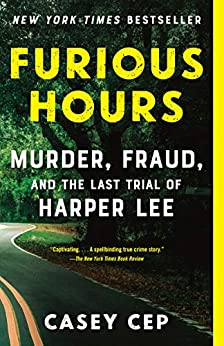More on this book
Community
Kindle Notes & Highlights
by
Casey Cep
Read between
May 25 - June 4, 2020
He could find the race card in any deck and played it against everyone who dissented from his white-supremacist brand of populism. Anyone who criticized him, he said, was a “low-down, carpet-baggin’, scallywaggin’, race-mixin’ liar.”
Despite what potboilers and Perry Mason would lead you to believe, Benn said, “most trials resemble warmed-over grits and it takes some doing to stay awake.”
Monroeville was the kind of town where if your sister served cake on a Friday, she would be featured in the newspaper for having “entertained,” and if your friend’s eighth birthday party included fruit punch and prizes, it might merit its own headline plus five column inches.
Whatever she had told herself before about law school—about acquiring discipline or fulfilling her father’s dreams—it wasn’t enough anymore. Six weeks shy of graduation, Nelle Lee dropped out. It had become obvious to her that a writer is someone who writes, and also that sooner or later everyone disappoints their parents: better, she figured, to get started on both.
Composing a single sheet of prose to her satisfaction could take an entire day. “I am more of a rewriter than a writer,” Lee said, and explained that everything she wrote, she wrote at least three times. She claimed that while there could be “no substitute for the love of language, for the beauty of an English sentence,” there was also “no substitute for struggling, if a struggle is needed.”
Lee could already tell that Capote was overly drawn to Perry Smith, partly because of a certain physical resemblance but mostly because of their common emotional experiences. Both men were the size and shape of a crab apple, and both had fallen from the same sort of tree: their fathers were absent, their mothers alcoholic.
reporters love trials because they “are transfixed by a process in which the person being asked a question actually has to answer it. He cannot say he would rather not comment. He cannot tell an anecdote on a different subject. He has to answer the question—under oath that he is telling the truth.”
What Harper Lee knew about Tom Radney’s South instinctively, she could have learned about Willie Maxwell’s South only through patient research and ongoing conversations of the kind that very few white Americans, then as now, ever have.
Introductions inhibit pleasure, they kill the joy of anticipation, they frustrate curiosity. The only good thing about Introductions is that in some cases they delay the dose to come. Mockingbird still says what it has to say; it has managed to survive the years without preamble.” HarperCollins printed Lee’s refusal as the foreword to its thirty-fifth anniversary edition.
Like small towns around Alabama and across America, it had lost itself to fast-food and chain stores, franchises taking over the way kudzu had decades before.
she replied to say that her own reporting had produced “a mountain of rumors and a molehill of facts.”


